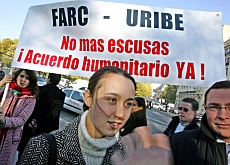Release of Colombian hostages welcomed

Switzerland has hailed the release of two women hostages by left-wing rebels in Colombia, a move seen as raising hopes for dozens of others held in secret camps.
In a statement, the foreign ministry offered its services to help find humanitarian solutions for all hostages and prisoners.
“Switzerland is delighted and relieved to hear of the release of Clara Rojas and Consuelo González, and salutes the efforts of those who made this possible,” it said.
Switzerland – together with France and Spain – has been engaged in securing the release of hostages in the Latin American country for several years.
The ministry said it would continue to work behind the scenes, providing its services when they are required.
The Swiss-run International Committee of the Red Cross (ICRC) oversaw Thursday’s handover, which came ten days after a first attempt failed.
Sign of hope
“Switzerland thanks in particular President of Colombia Álvaro Uribe and the president of Venezuela, Hugo Chávez, for their collaboration,” a statement said.
It also saluted the Revolutionary Armed Forces of Colombia group (Farc) for its gesture.
“Switzerland is convinced that such a solution must lead to the resumption of the peace process in Colombia,” the foreign ministry said.
Foreign Minister Micheline Calmy-Rey told Swiss public radio that she was very happy with the outcome.
“This liberation is a step in the right direction of a deal for the liberation of all the prisoners,” she added. “Reaching a humanitarian accord for these people has always been our strategic goal.”
Six years waiting
The Colombian rebels allowed helicopters sent by Chávez to airlift the women from rebel-controlled territory to relatives who have waited about six years for their freedom.
Chávez expressed hope the successful mission could be repeated for former Colombian presidential candidate Ingrid Betancourt and dozens of other captives held by the Farc. But, he said, that largely depends on the willingness of Colombia’s US-allied President Uribe.
The handover was the most important hostage release in the Colombian conflict since 2001, when the rebel movement freed some 300 soldiers and police officers.
The guerrillas have offered to trade 44 hostages for hundreds of rebel fighters imprisoned in Colombia and the US.
Chávez had been trying to negotiate that exchange in November when Uribe called him off, accusing the Venezuelan of overstepping his bounds by contacting the head of Colombia’s army.
swissinfo with agencies
The Colombian government and the 17,000 strong leftwing rebels, Revolutionary Armed Forces of Colombia (Farc), have been fighting each other for four decades.
There are an estimated 3,200 kidnap victims held by various rebel groups and criminals in Colombia, according to government figures.
Farc is believed to have kidnapped about 700 people.
The guerrillas were organised in the 1960s to force land reforms and other measures meant to close the wide gap that separates rich and poor in the Andean country.
They are said to fund their operations with extortion, kidnapping for ransom, drug smuggling and contraband gasoline.

In compliance with the JTI standards
More: SWI swissinfo.ch certified by the Journalism Trust Initiative











You can find an overview of ongoing debates with our journalists here . Please join us!
If you want to start a conversation about a topic raised in this article or want to report factual errors, email us at english@swissinfo.ch.